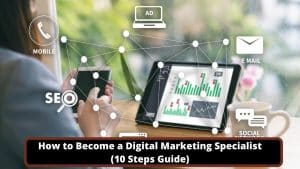What is Digital Marketing?
Digital marketing is a process that uses digital channels to promote and sell products or services and handle by a digital marketing specialist. In other words, it’s the use of electronic media to market and communicate with customers. It has been around for about 20 years but only recently become commonplace.
A digital marketing specialist works alongside a company’s marketing team to create a brand image and maintain a marketing campaign for the internet, with an emphasis on digital technologies. Digital marketing is primarily delivered through digital channels, which are any type of electronic communication medium used to reach consumers. These include websites, social media platforms, email newsletters, search engine optimization (SEO), pay-per-click (PPC) advertising, and mobile apps.
The advent of smartphones and tablets has created new opportunities for marketers as more people access the internet through these devices than ever before. Additionally, advancements in technology have made it easier than ever to tailor marketing messages specifically for individual customers based on their interests and needs. This two-way exchange between brands and customers allows companies to gain valuable insights into customer behaviour that was not possible before the digital age
What does a Digital Marketing Specialist Do?
Digital marketing specialists have a lot of responsibility when it comes to promoting a company’s products. They use technology platforms to communicate with consumers, and their goal is to develop successful campaigns that will achieve business objectives. Additionally, they are responsible for analyzing consumer trends and demand in order to create strategies accordingly.
In addition, digital marketers must be able to effectively translate business goals into marketing plans. They also need creativity and knowledge of key areas within digital marketing-SEO, social media, content marketing, email marketing, PPC, and SEM. As such, it’s important for digital marketers to keep up with the latest changes in these industries so that they can provide the best possible service for their clients or employers.
10 Steps to Become a Digital Marketing Specialist
1. Learn Digital Marketing Essentials
Digital marketing is not a single discipline but it’s a term that encapsulates many techniques and methods. So, where do you start?
Watch this video to get an idea of what digital marketing specialists do. They are involved in creating, managing, executing, and measuring digital marketing campaigns across a variety of channels.
The most important marketing channels are websites, search engines, content, social media, and email. You need to be proficient in all of these channels to become a successful digital marketer.
The full course is a comprehensive resource for learning about various aspects of digital marketing such as SEO copywriting, Google AdWords Fundamentals, web analytics and more. It will take you some time to go through the entire course but it’s worth the effort!
Digital marketing is a broad topic with many different facets. That’s why it’s important to have several steps or stages that will help you focus on specific areas and eventually become a specialist in this field.
2. Work as an SEO Expert
If you want to work as an SEO Expert, it is important that you learn about optimization techniques. You can learn SEO by following a course and getting certified. This certification will help you understand the basics of how search engines work and how to optimize a website for better visibility.
You should also specialize in one or two areas of digital marketing like PPC (pay-per-click) or social media marketing. Having this specialization will make you more attractive to potential employers and clients. Additionally, it is important to have good sales skills so that you can convert leads into customers.
3. Master PPC Advertising
In order to be a successful digital marketing specialist, you need to know how to manage PPC campaigns on Google Ads or Facebook.
You can join a course that teaches you how to effectively implement and measure PPC campaigns. Once you have this skill, you can enhance your skills by taking advantage of learning opportunities such as:
– Learning about Google Adwords
– Understanding SEO
– Knowing about PPC
4. Build Social Media Marketing Skills
In order to become a social media manager, you need to learn how marketing works on other networks like Twitter, Pinterest, or LinkedIn. You should also be familiar with the skills necessary for becoming a social media manager. These include creating and managing content, understanding algorithms and how they work, conducting effective social media campaigns, as well as creating ads.
Additionally, digital marketing requires fast adaptation to changes in the industry; therefore, it is important that you are always learning new things and keeping up with the latest trends. Finally, if you want to make it big in digital marketing, you’ll need skills like persuasion and salesmanship. It’s also important to be open to new ideas and concepts – after all, innovation is key in this field!
Lastly, collaboration is key in digital marketing – especially when there are multiple stakeholders involved. In order to be successful in this field, you must have excellent listening skills so that you can understand everyone’s needs and wants.
5. Implement Content Marketing Campaigns
Now that you know what content marketing is and some of its benefits, it’s time to start implementing content marketing campaigns. The first step is to determine your goals for the campaign. What do you want to achieve? Once you know your goal, you can begin developing content that will help you reach it.
Content marketing has a wide variety of formats for your audience like articles, landing pages, YouTube videos, etc. You need to have a plan on what type of content you want to produce and when or how it needs to measure its performance. This type of information will help guide your overall strategy and keep everyone on track.
Then comes the hard part: creating the actual content! Fortunately, there are plenty of online courses (such as this one) that can teach you how to write great copy, create engaging videos, and more. Once your content is created, it’s time to promote it! Share it with your followers on social media, submit it to article directories, and more.
6. Learn How Email Marketing Works
Email is still the best way to generate leads and close a sale. In fact, Forrester found that email is almost 40 times more effective than Facebook and Twitter combined when it comes to generating ROI for marketers.
Digital marketing campaigns generate leads for email marketing, which will do sales through targeted emails. That’s why it’s so important for digital marketers to understand how email marketing works and what makes it so successful.
An email marketing specialist is responsible for managing campaigns. They are responsible for creating effective subject lines, designing catchy email templates, writing persuasive copy, targeting the right subscribers, and tracking results. The role of an email marketing specialist is not found in most teams, so the responsibility falls under the supervision of a digital marketing manager.
7. Build Team Management Skills
In order to be successful as a digital marketing specialist, you need to have good team management skills. This is because a large part of your job will involve leading and managing a team of other specialists who make up the digital marketing team. You’ll also need to know how to manage projects and set goals and targets.
One way to develop these skills is by having an expert team interview you or suggest alternative options if they believe there’s a better opportunity for you. Additionally, it is important to have project management tools so that your team can progress on time, with the right amount of focus and attention on each task
8. Learn How to Use Data Analysis / Reporting tools
Digital marketing managers need to know how to use several digital marketing tools in order to optimize and monitor campaigns. They must also be able to analyze data and prepare reports for the team or client.
One of the most important tools that a digital marketer should learn is Google Analytics. This tool will help you understand your website traffic, including information on who is visiting your site, where they are coming from, what they are doing on your site, and more.
In addition to Google Analytics, other useful reporting tools include SEMRUSH or similar tools such as Ahrefs, Moz, HubSpot, etc. These tools allow you to track competitor sites and measure their performance over time.
9. Get a Digital Marketing Certification
You can become a digital marketing specialist by following a comprehensive digital marketing course. Digital marketing courses are an efficient way to learn everything you need to know about the industry and will teach you how to be good at it without having to read separate guides or look for additional resources.
Certification is not the same as being a good digital marketer, but it does show that an individual has taken the time and effort to learn about the industry. It also demonstrates that they are dedicated enough to want formal recognition of their skillset.
Before working for a company, you need to have several years of experience and ways to demonstrate your expertise. One great way of proving this is through certification programs offered by various providers such as Google, HubSpot, Facebook, Hootsuite Academy, etc.
Pay later- Get it done now with this low-interest credit card debt solution that pays back in 4 instalments without interest! You can use this debt consolidation loan calculator tool on our website today! Successful completion of tasks earns points towards rewards, including gift cards and entertainment vouchers from our partners such as Amazon and iTunes. This process takes time! However, it’s worth noting that some employers might not require certification at all so always do your research!
10. Stay Updated on the Latest Digital Marketing Trends
Digital marketing is a dynamic and ever-changing field. To stay ahead of the curve, it’s important to keep up with the latest trends. Thankfully, there are many resources available to help digital marketing professionals do just that.
Learning never stops in digital marketing – you have to be constantly learning and evolving your skills to keep up with the changes in the industry. There are many resources available to help you do that, including:
Marketing Land is updated daily so you can stay up-to-date on all the latest marketing trends; The Google blog, which provides updates on all Google products and services and their latest news; And other publications such as the Search Engine Journal and Social Media Examiner, also offer insights into the latest digital marketing trends.
FAQs
What is the role of a digital marketer?
A digital marketer is someone who is responsible for developing and maintaining a company’s online presence. This may include creating and managing social media profiles, forecasting marketing campaign growth, and ROI, and reporting these findings to leadership. Additionally, the digital marketer will be in charge of copywriting for marketing campaigns as well as handling the digital aspect of marketing (including analytics and design tools).
It is also the responsibility of the content marketer to decide how best to drive traffic to the company website/s – a daunting task in today’s constantly-evolving online landscape. In order to stay ahead of the curve, it is essential that content marketers keep up with new social media trends, web technologies, and digital marketing practices. Then, once they have implemented these new technologies into their campaigns, they must update existing campaigns accordingly.
What are the 5 different job levels in marketing?
There are five different job levels in marketing:
1) Digital Marketing Specialist typically reports to the Digital Marketing Manager.
2) Digital Marketing Specialists may also report to a Vice President of Marketing when no manager is available.
3) A marketing Coordinator typically reports to a Digital Marketing Manager or Marketing Director.
4) Assistant Brand Manager typically reports to a Brand Manager or higher-level executive.
5) Brand Manager typically has ownership of a product line and reports to a Senior Product Manager, Director of Marketing, or Vice President of Marketing.
Is a digital marketing specialist a good job?
The digital marketing specialist is a great job for someone who is willing to put in the effort. The key positive aspects include working remotely or while travelling and that it is an exciting field to work in. The negative side is that it’s difficult if you have a family, or there are other responsibilities outside of work you must attend to.




